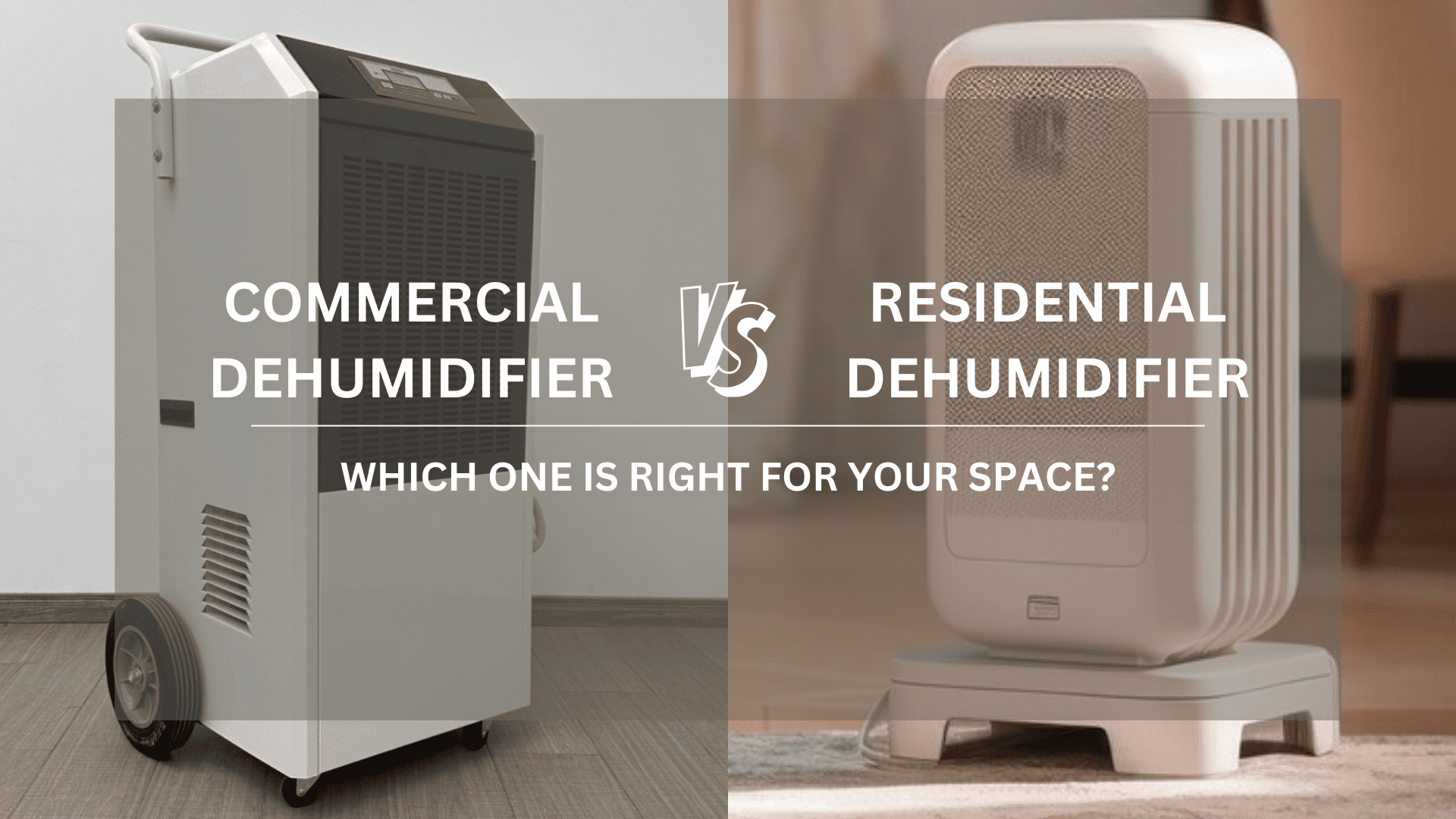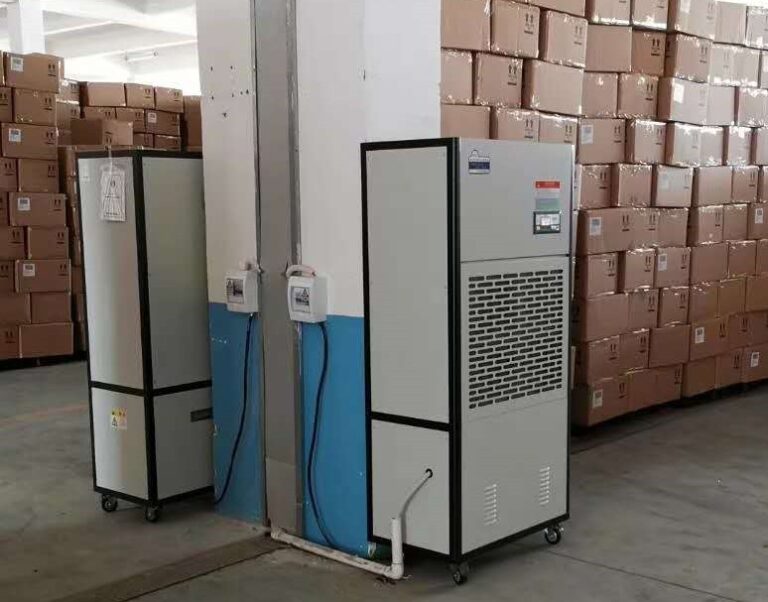No matter whether you buy a commercial dehumidifier or a residential one, both serve the same basic purpose – to remove moisture from the air. So, what’s the real difference? You might think-
- Commercial Dehumidifier: Suitable for commercial spaces
- Residential Dehumidifier: Suitable for homes
That’s correct! But is that all? Well… this blog will break down the key differences and help you decide which one is right for your space. Keep reading…
What are Commercial Dehumidifiers?
In simple words – commercial dehumidifiers are used to reduce humidity in large areas where constant moisture controlling is crucial. For instance, if you have places like gyms, commercial kitchens, warehouses that get easily damped, commercial dehumidifiers could be the only best option.
Considering the working principle, there are three types of commercial dehumidifiers available in the market. And they are-
- Refrigerant Dehumidifiers: Refrigerant dehumidifiers intake humid air from your commercial space and cool it down using a refrigerant coil. During the whole process, the humidity level drops. These types of dehumidifiers are suitable for places like gyms, commercial kitchens, etc.
- Desiccant Dehumidifiers: Unlike refrigerant dehumidifiers, desiccant dehumidifiers use desiccant substances that can absorb moisture from the air. These types of dehumidifiers include a desiccant wheel, an internal heater, and a blower, which help to reduce moisture from the air.
- LGR Dehumidifiers: They work in a similar way as refrigerant dehumidifiers work. But they come with a double-layered cooling system, which enables them to work in extremely humid environments. Especially when the air temperature is high, LGR dehumidifiers can perform more effectively.
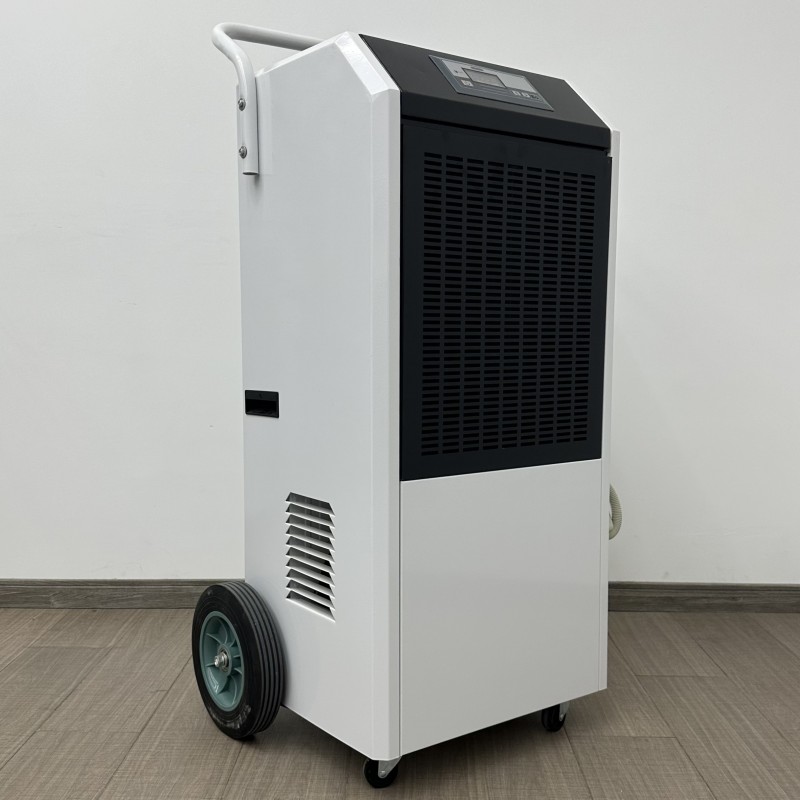
What are Residential Dehumidifiers?
As the name suggests, residential dehumidifiers are used in residential areas. They have less humidity controlling power than a commercial dehumidifier. You can easily install one at your home (or you can also buy a portable one that requires no installation).
Overall, these units are made for home and small-scale use. So, unlike the commercial one, you can use it in your bedrooms, basements, living rooms, or even laundry areas.
You’ll find two types of dehumidifiers in the market for your home-
- Portable Dehumidifiers: They come with two pairs of caster wheels, making the dehumidifiers portable. They are useful to dehumidify air from different parts of your home.
- Whole-House Dehumidifiers: They are expensive compared to portable dehumidifiers and require professional hands to install. Whole-house dehumidifiers are mainly larger systems that require integrating with your home’s existing HVAC system.
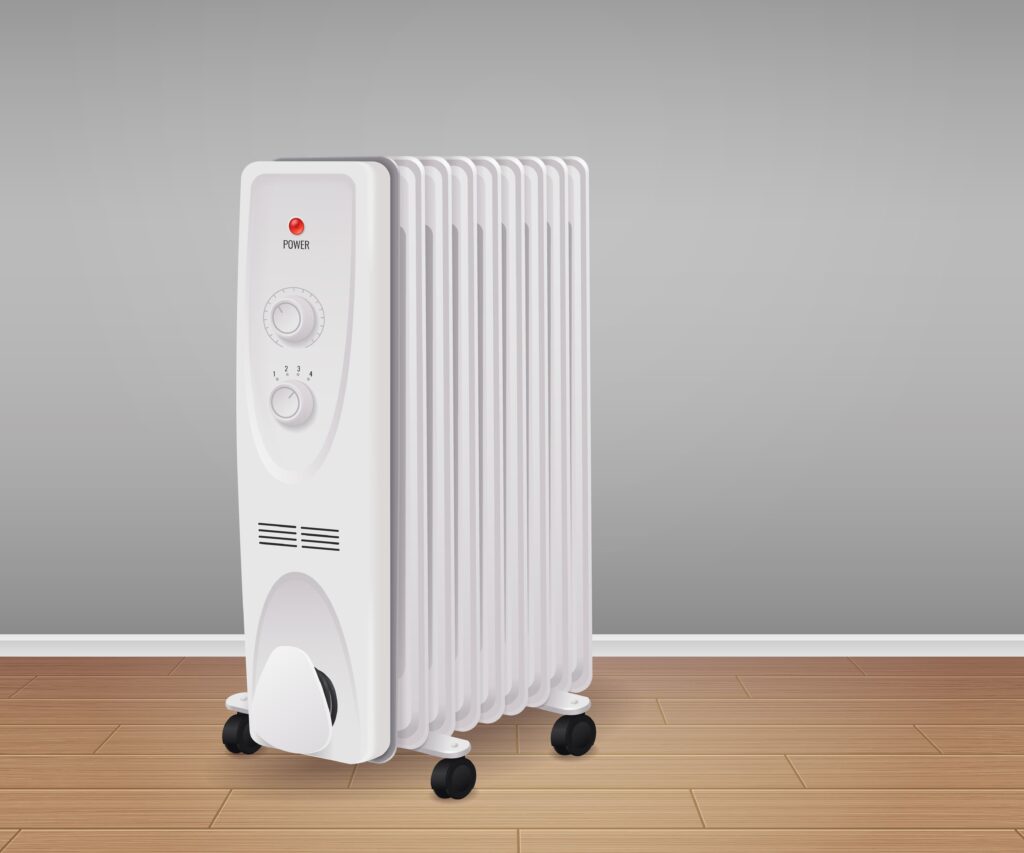
Key Differences Between Commercial and Residential Dehumidifiers
We’re pretty sure that you already understand the difference between commercial and residential dehumidifiers. In simple words-
- Commercial Dehumidifiers: Suitable for commercial spaces
- Residential Dehumidifiers: Suitable for home
That means, from the functional aspects both are same. Commercial dehumidifiers have larger capacity to dehumidify the indoor. On the other hand, residential dehumidifiers have less ability to dehumidify your home.
Here is the table that will allow you to get the key differences between them.
| Feature | Residential Dehumidifiers | Commercial Dehumidifiers |
| Capacity | Removes 30-70 pints of moisture per day. | Removes 70-200+ pints of moisture per day. |
| Coverage Area | Best for small to medium-sized spaces like bedrooms or basements. | Designed for large areas such as warehouses and factories. |
| Durability | Built for everyday home use, less heavy-duty. | Designed for tough conditions, built to withstand constant use. |
| Humidity Control | Provides basic humidity control for everyday household needs. | Offers advanced humidity control for large or commercial spaces. |
| Portability | Lightweight and portable for easy moving within the home. | Less portable, often requires permanent or semi-permanent installation. |
| Energy Efficiency | Energy-efficient and ideal for low energy consumption. | Higher energy consumption, designed for larger-scale operations. |
| Size and Weight | Compact, easy to place in tight spaces. | Larger and heavier, often requiring more space and setup. |
| Noise Level | Quieter, suitable for use in living areas like bedrooms. | Louder, designed for environments where noise is less of a concern. |
| Maintenance | Requires simple cleaning and occasional filter changes. | Requires more frequent and complex maintenance due to heavy use. |
| Installation | Easy, plug-and-play setup for residential spaces. | Often requires professional installation for optimal performance. |
| Best For | Homes, apartments, bedrooms, basements, bathrooms. | Large commercial spaces, warehouses, factories, and flood-prone areas. |
Is it Possible to Use a Commercial Dehumidifier in My Home?
Technically, the answer is – YES! Especially when the indoor area of your home is comparatively large and produces a larger volume of humidity, commercial dehumidifiers can work best.
It might seem to you that commercial units might require complex installation. That’s partially true! But some advanced commercial dehumidifiers have recently arrived on the market that require no installation.
For instance, here are some commercial dehumidifier models that come with caster wheels, making them portable. So you can move them anywhere you want and they require no installation.
| Model | Feature | Capacity | Air volume | Rated Power | Area | Net Weight |
| YC-60E | Classic Type | 60L/D; 127Pints/D | 550m3/h | 930W | up to 70m2 | 36kg |
| YC-60W | Water Tank Type | 60L/D; 127Pints/D | 550m3/h | 930W | up to 70m2 | 35kg |
| YC-60H | Big wheels and handle | 60L/D; 127Pints/D | 550m3/h | 930W | up to 70m2 | 37.5kg |
If you’d love to explore more models that you can use at your home, you can visit our dedicated page on Commercial Dehumidifiers. We believe you’ll find the most appropriate dehumidifier for your home from the extensive collection.
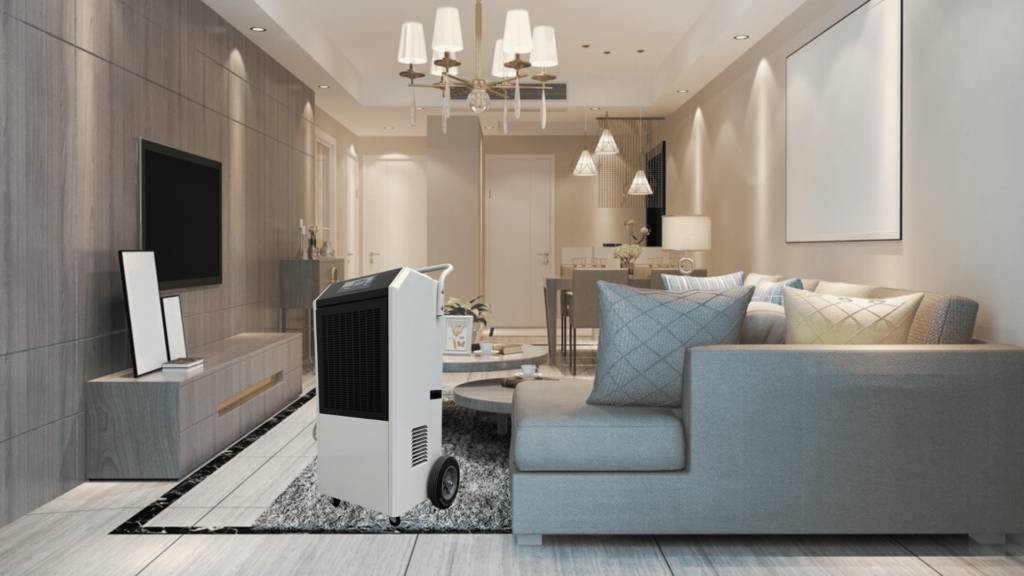
Cost Comparison: Commercial Dehumidifier vs Residential
Residential dehumidifiers are cost-effective options compared to commercial ones. For commercial spaces, commercial dehumidifiers are the only options for efficient dehumidifying.
Here’s the detailed breakdown of the costing for both you can check out-
| Feature | Commercial Dehumidifier | Residential Dehumidifier |
| Initial Purchase Price | $1,500 – $3,500 | $150 – $600 |
| Operating Costs | $50 – $150 per month (higher due to power and size) | $15 – $40 per month (lower due to smaller capacity) |
| Maintenance Costs | $100 – $300 per year (complex parts and frequent upkeep) | $50 – $150 per year (simpler components, less frequent) |
| Repairing Costs | $100 – $500 per part (more expensive due to complexity) | $20 – $100 per part (cheaper and simpler repairs) |
| Monthly Operating Cost | $150 – $300 (high energy use due to larger size and power) | $30 – $70 (lower power consumption) |
Note: The numbers have been roughly estimated based on commercial and residential dehumidifiers from the different brands available in the market. Depending on the brands, rated power consumption rate, and other factors, the numbers might vary slightly.
When Should You Choose a Commercial Dehumidifier?
If your space is large, you experience extreme humidity problems, or you’re going to be dealing with serious moisture problems, a commercial dehumidifier is likely your best option. These machines extract a lot more moisture than residential units and are designed to work on larger, more taxing jobs.
In simple words, you can buy a commercial dehumidifier if-
- You have large areas with excess moisture.
- Humidity levels are extremely high.
- Your space requires a heavy-duty solution.
- There’s a high risk of mold or mildew.
When Should You Choose a Residential Dehumidifier?
You should choose a residential dehumidifier when you have small area in your home that face with medium humidity. These are ideal for places that do not require commercial-grade moisture extraction.
Residential dehumidifiers are easier to use, quieter and more energy-efficient than commercial models. For your living room to your bedroom, residential dehumidifiers are the most suitable option.
For you convenience, we want to mention some areas where a residential dehumidifier is the best option-
- Bedroom or Living Room: Where you need to deal with mild moisture and you want to reduce allergens.
- Basements: Standard basements that don’t have extreme moisture issues. In that case a residential unit can handle the job just fine.
- Bathrooms: If you have a bathroom that gets steamy after showers.
- Small Offices or Apartments: Where you need to deal with moderate lever moisture, but a residential dehumidifier unit can handle it.
Final Verdict
To conclude, the power consumption rate or electricity bill should not be the only driving factor in buying a commercial or residential dehumidifier. Rather, it’s important to consider the space and determine if it requires a commercial unit or if a residential one is enough to serve your purpose.
The best option could be to contact a professional who can provide proper guidance. With their extensive expertise, they can protect your investment.
Frequently Asked Questions (FAQ)
Will a residential dehumidifier work for extreme humidity in a big room?
Although a residential dehumidifier is effective in regular sized rooms with moderate humidity levels, it may be unable to handle more significant areas or extreme moisture. If your room is large or you’re facing a serious humidity problem, using a commercial dehumidifier may be the only way to successfully reduce moisture.
How can I tell if I need a commercial dehumidifier?
In reality, commercial dehumidifiers are appropriate for larger spaces. So, if you have any commercial space like gym, large kitchen area, etc, where moistures are produced in a larger volume, you can use commercial dehumidifiers. But if your home is dealing with the situations where constant moistures are produced, you can use a dehumidifier in that case as well. After all – here the main focus is the moisture production rate that you need to deal with (not the place).
How much energy does a residential dehumidifier use compared to a commercial one?
Commercial dehumidifiers tend to have a larger capacity and perform better, which means they also use more energy. The residential units are designed to be energy-efficient so it is useful for your daily home use. To get a more informed idea, you can check out the section “Cost Comparison : Commercial Dehumidifier vs Residential” we discussed above.
How often do I need to service or clean my dehumidifier?
Regular maintenance is crucial for both residential and commercial dehumidifiers. For example, residential units often need to be cleaned personally every 1-2 months; commercial units typically need service even more frequently, and may need filter replacement and mold checks.
Am I able to use a commercial dehumidifier in a small apartment?
Technically – YES! But that’s not the ideal thing to do. Commercial dehumidifiers are manufactured to deal with high moisture production rates. As your small apartment won’t produce that level of moisture, using a residential unit would be the best move. But if your apartment produces too much moisture that a residential unit can’t handle, you can then consider installing a commercial one.
How much more do they remove from the water?
The key difference is in their water extraction abilities. Residential dehumidifiers usually remove about 30 to 70 pints of water daily, depending on the model and the size of the room. Commercial dehumidifiers, however, can extract from 70 to more than 200 pints per day, making them well-suited for expansive areas or locations with extreme humidity. For larger amounts of moisture removal, a commercial unit is built for that.

